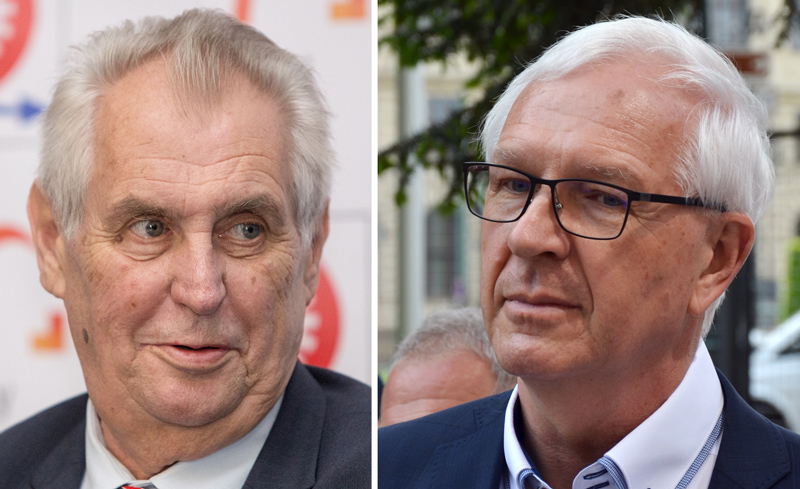The significance of the upcoming run-off of the presidential election in Czech Republic is largely underestimated in Washington. But its prevalent view of it as a not too significant event in a small European country is dead wrong.
Contenders include the sitting President, outspoken and politically incorrect Milos Zeman, who garnered 39% of the vote in the first of a two-phase election. His rival is chemist Jiri Drahos, the correct, low key, former president of the Czech Academy of Sciences, who won 27%. A tight race is expected in the January 26-27 vote.
 Pictured: Czech President Milos Zeman (left) and Jiri Drahos (right), the two contenders in the January 26-27 run-off vote for the Czech Republic presidency. (Image source: Zeman, OISV/Wikimedia Commons; Drahos, Jindřich Nosek/Wikimedia Commons) |
In America, Zeman's foes are led by former Secretary of State Madeleine Albright, together with President Barack Obama's State Department holdovers. They yearn for Zeman's defeat at they do for the downfall of President Donald Trump, whom Zeman in some ways resembles.
As with Trump, one of key issues is whether Zeman is pro-Russian as maintained by his foes in U.S and Czech media. Yet even more crucial is Zeman's hard line on Muslim immigration. He adamantly refuses to obey the European Union immigration quotas, even in the face of EU lawsuits.
A bit of Czech history is in order here. Curiously, the Prague events in last century on dates ending in the number 8, have often witnessed developments with major implications. In 1918, the founding of democratic Czechoslovakia by exiled Czech politician Tomas Masaryk intensified the collapse of the Austro-Hungarian empire. In 1938, British and French appeasement of Adolf Hitler at Munich and the Nazi occupation of the Czech Sudetenland adumbrated the outbreak of World War II a year later. In 1948 a Communist coup in still democratic Prague was a key impetus for the creation of NATO a year later.
In 1968 the Soviet invasion of Czechoslovakia aimed at quelling the infectious Prague Spring, became in the words of my mentor, Josef Korbel (Madeleine Albright's father), "the inextinguishable spark" for future democratic revolutions. That happened in 1989 as playwright Vaclav Havel, "an outstanding dissident," in Zeman's words, became president of a new, democratic Czech Republic.
This is 2018. Is change again in the wind? Hungary's prime minister, Viktor Orbán, opposing Brussels' dictates along with Zeman, thinks so:
"Europeans have a clear will. They don't want to live under the threat of terrorism, they want their borders to be protected ... I believe 2018 will be the year of the restoration of the will of the people of Europe."
As for the widely bruited charge that he is pro-Russian: In 1968, this writer, a former classmate of Zeman's in the Prague School of Economics, together defended the Prague reforms before hostile academic audiences in Leningrad and Moscow just weeks before the Soviet invasion. Expelled from the Communist Party, for his opposition to the Soviets, Zeman was also thrice in two decades fired from his job. In contrast, his opponent in the run-off, Drahos, repeatedly traveled to West under the watchful supervision of the Czech secret police.
Thus, it is comical and disturbing to see the mainstream media cast the Zeman-Drahos struggle as a choice of whether Prague will "lean east or west." A January 14 The New York Times article even cited a political observer's Kafkaesque absurdity that if Zeman is reelected he'll be "flying a Russian flag from Prague Castle."
While Havel used to belittle the concept of national interest, Zeman, an economist, favors good relations with Russia because geo-economics requires this. The Czech Republic still depends on the Kremlin's energy resources and trade, leading Zeman to remain neutral in the Russo-Ukrainian conflict. Yet, he is serious about fulfilling the required Czech contribution to NATO.
Zeman has been vehement in his support of Israel. He compared Arafat to Hitler for supporting terrorism. He launched yearly meetings of the Israeli and Czech cabinets. He supported Trump's decision to move the U.S.to Jerusalem. Israeli Prime Minister Benjamin Netanyahu singled him out as "the best friend Israel has in Europe."
Zeman's defeat would deprive Europe of a powerful voice against anti-Semitism and Islamo-fascism. Drahos, an inexperienced leader, is more likely to be malleable to Brussels's demands on accepting quotas on Muslim immigration. The result of the Czech vote will reverberate through Europe.
Consequently, Zeman's reelection is in America's national interest.
Jiri Valenta is a nonresident senior fellow at the BESA Center for Strategic Studies at Bar Ilan University, Israel and author of "Soviet Intervention in Czechoslovakia, 1968" (Johns Hopkins, 1990).


